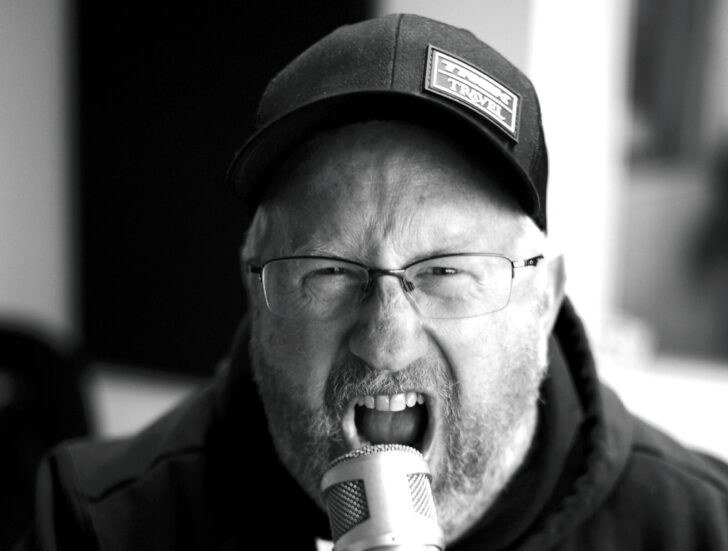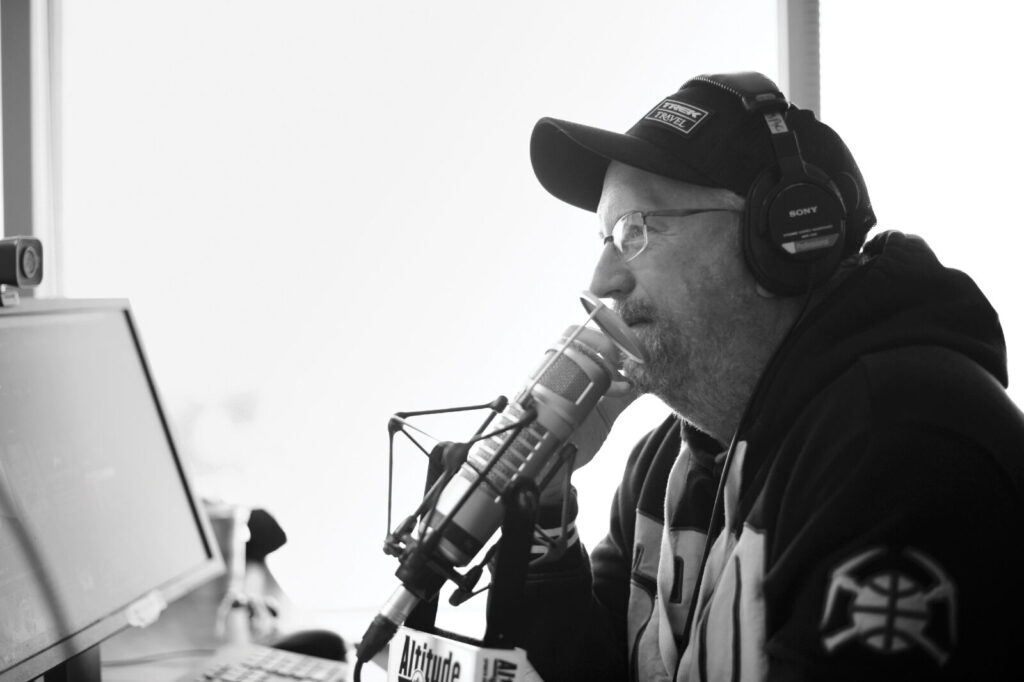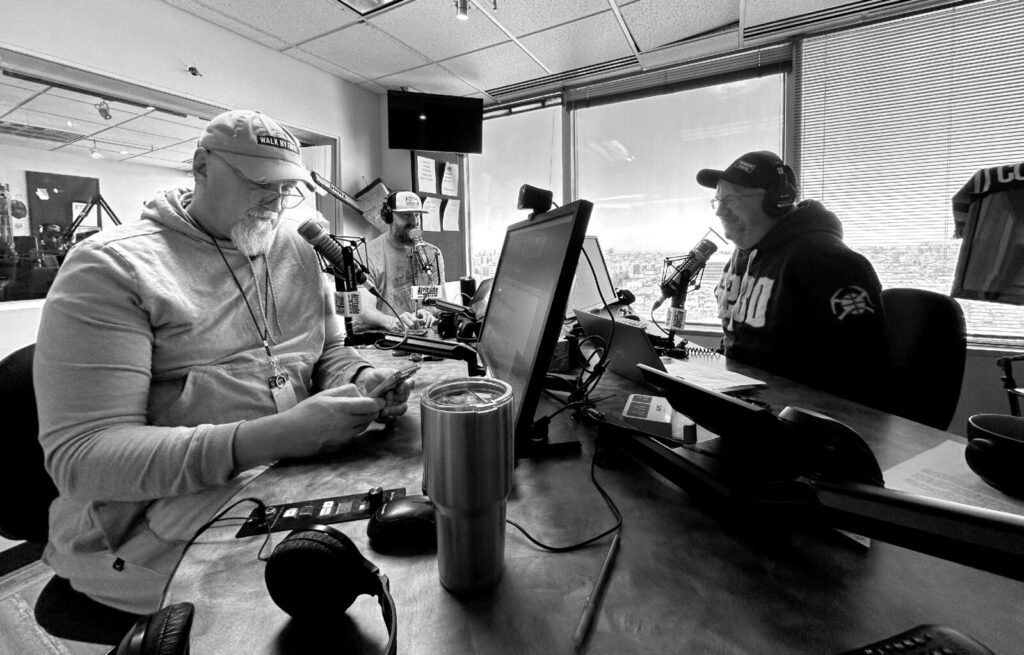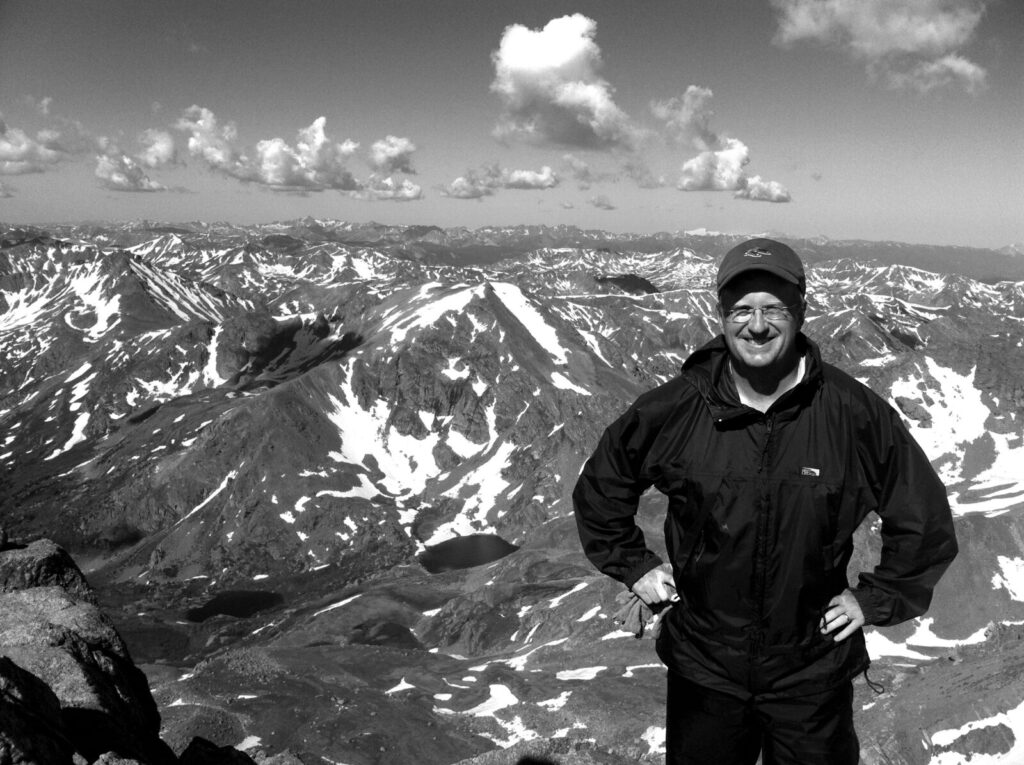The following interview appears in the December issue of Mile High Sports Magazine. Buy your copy here.
Doug Ottewill: From your last day at The Fan, to your first day on the new show with Scott Hastings and Tyler Polumbus on Altitude, you were off air for 39 days. What’s that like for a guy like you, someone who’s been coming up with four hours of conversation every weekday for 36 years?
D-Mac: The longest I was just off the radio was actually five months; it was the period between Buffalo and working in Washington, D.C. So, I didn’t hit that mark. But it’s certainly the longest I had been off the air in Denver, since 1999, because when I was fired from KBPI, I got a job within a couple of weeks in Colorado Springs and started doing talk radio at KOA. So to be off the air for basically six weeks in Denver really was the longest time in 24 years that I had not been on the radio whatsoever in Denver, Colorado. It was strange. It was weird. I did some weird things.
Ottewill: Weird things? Expand on that.
D-Mac: I started a podcast. There were rules about radio stuff I could do, but I was able to figure a few quirky things out. I was allowed to do whatever I wanted to do as long as I wasn’t working for a radio or TV company. So, I just started my own podcast. Now, I wasn’t getting paid for it. I wasn’t making any kind of money. I still am not making any money from all the podcast stuff I’m doing, but at least allowed me to sort of talk about sports and get that out of my system multiple times a day. And I was able to cover sports because I’ve got a buddy, Bob Richards, who owns three small stations in Monte Vista down by Alamosa – so far outside the Denver radio reach that I wasn’t breaking any rules being a correspondent for 96.5 The Fox in Monte Vista. I got credentials for all the sporting events here in Denver through 96.5. I was a legitimate, credentialed, employee of a radio station. I wasn’t making money through 96.5; it was more about being able to get credentials. I wrote a couple articles and did call-ins. That kept me around and working, and there were times where I was clearly the hardest working unemployed man in the history of Colorado media.
Ottewill: Did you see it coming or did it come as a surprise?
D-Mac: Let’s say this: I’ve been working in radio a long time, so I have a lot of experience in how things go. I never wanted to leave The Fan, never. But I also had the experience in radio where you just have to be smart about your career, and you have to be aware of things going on. I always hope for the best, never wanted to be fired. But you’ve got to be prepared. It’s tricky. You always hope for the best, but you prepare for the worst. That’s more or less the situation I was in.
Ottewill: What was the hardest part of learning you’d no longer be doing a show that you’d been on for 14 years?
D-Mac: It’s the relationships that you have with people that you love and trust and want to be with. It’s you feel it’s somewhat of a legacy. It’s 14 years of the same show – it’s the listeners and the texters. I give out my phone number on the air, so I was overwhelmed by people reaching out to me. I didn’t expect it. I think what happened was I just became part of people’s lives. And sometimes you just sort of take things like that for granted. I don’t think there’s anything wrong with that. I think that’s probably a good thing. When people are coming up to me on the street – literally had people stopping me on the street, that’s not just an expression –and saying, “I hope you’re alright.” I would get a lot of comments like, I listened to you from back when you were on KBPI, right? That was 24 years ago! That’s so meaningful that they still recall it and remember it. So, to a weird degree, it’s as if I didn’t want to let people down either. It was important for me to let people know I wasn’t even close to feeling like I was done or wanted to retire or stop working. Just the opposite. you know, both my kids are out of the house. My older son is working professionally in downtown Denver. My younger son is a redshirt junior playing baseball at Webster University in St. Louis. My wife and I have been together since 1987, married since 1994; we’re in this thing for the long haul. We’re not done, not even close. I feel like a 26-year-old. Yeah. I’m an empty nester with nothing to do. I hate hobbies. I hate mowing the lawn. I can’t fix anything. I want to get out there and work.
Ottewill: You can be a polarizing personality though. What about your detractors?
D-Mac: It was overwhelming. I got a lot of “even though I don’t always agree with you”, or “I think your takes are idiotic,” I miss listening to you. It was wild. The amount of like, “Hey, you got what you deserved. I’m glad you’re off the air,” I could count that on one hand. And that includes, by the way – I can’t say names here – some interesting people in the Denver sports community in terms of the professional teams here in town. That was very surprising and extremely flattering to hear from, just not the fans, which is great, but to actually hear from all of the pro sports teams here in town, too.
Ottewill: Surprised because you’ve been critical of teams or players?
D-Mac: I’m not telling anybody how to do their job, but for me, how exactly am I supposed to be critical of somebody if I don’t do that work, if I’m not there? If I don’t hear what they have to say? If I’m not around it when I could be around it? Think about how lucky we are to have moments where we’re allowed to be around it, where the regular fan isn’t! To me, it almost feels like an obligation. When you hear criticism from me it comes with the insight of actually being there. I think that that makes my opinion – even though it might sound confrontational – credible. I might not have played the game, but I’m around it. I can tell you what these people are really like, and I can tell you what they’re not like. Frankly, I think that’s been my secret sauce over all these years.
Ottewill: It’s got to feel good getting picked up less than two months later by your former station’s top competitor. Any vindication in that?
D-Mac: When I was let go, I had interest from multiple places immediately, and that felt great. I couldn’t be happier where I ended up – could not be happier. I don’t know if “vindication” is the right word. In this business, you’re just so paranoid; it’s almost like relief, not vindication. The paranoia about being a broadcaster… it’s got to be the most idiotic choice to hang your shingle on and make a life out of. I mean, who would do this? I’m like the guy who’s the bass player who quit his day job to, to get in the back of the station wagon with the band. I have not given myself any other choices. Right? This is it. I really didn’t want to leave Colorado. With all my years of experience, I suppose I could always get a job somewhere, but I didn’t want to go somewhere else. I love it here. I’ve built up a lot of equity here in the state of Colorado, and literally is my favorite place in the country. I’ve been all over the country, including my hometown of Boston. And I swear to God – this is not just a line – I would never want to live anywhere else.
Ottewill: You’ve worked with – and continue to work with – a lot of former professional athletes. What’s fun about that? What’s challenging?
D-Mac: You’re going be as successful as the degree that your partner is riding with you. The tippy top of the mountain for a partner is that ex-pro who cares about his job, prepares for his job and has a great sense of humor. And I’ve been lucky to work with several of those, and I’ve worked with others that aren’t like that; if they’re not like that, it can be really, really bad. But, you know, it’s my second go around with Tyler Polumbus, specifically, and he’s exactly like that. He’s an ex-pro, local guy, who is so professional, prepares for his job, has a great sense of humor. He’s self-deprecating, because he was always one of these pros who was on the edge for the most part of his career. Alfred Williams, same exact thing. Yeah. There wasn’t a day that I came to work where he wasn’t prepared and good to go. Tom Nalen, same exact thing. Chad Brown, Nate Jackson and Scott Hastings, who I work with now. I’ve worked with some amazing ex-pros that are prepared and ready to do their job. And when you get guys like that there’s nothing better.
Ottewill: A few years back it felt as if The Fan made a very conscious decision to talk all Broncos all the time. It’s a Broncos town, so that makes sense. But it always felt like you did a lot to keep up with the Nuggets and Avalanche, particularly during their title runs. Is this move to Altitude, where the conversation tends to cover all the teams more equally, somewhat reinvigorating?
D-Mac: I am a terrestrial, sports broadcast host. The nature of terrestrial radio is that still, in this day and age of technology, most of the people just listen to the radio in their cars, when they’re driving from point A to point B. You have to be able to work within the system itself in order to generate ratings and revenue. I’ve always worked for very traditional, terrestrial, revenue-generated, ratings-based stations. It’s not personal for me. If it was personal for me, I’d be talking about baseball. I started my own nonprofit baseball organization. My son plays college baseball. I love baseball. But you don’t catch me talking a lot about the Rockies, do you? When I started in college radio, my college radio station, Z89 in Syracuse, was a “top-40″ station. I hated top-40 music. I was a rocker. I was into Ozzy Osborne, Van Halen, Def Leppard, Black Sabbath, Led Zeppelin – you know, that stuff. I wasn’t into Madonna, George Michael or Michael Jackson. But my college radio station played that music. So what I learned at a very young age is that it’s not a personal thing; it’s a professional thing. You learn how to be a pro, and part of being a pro is to understand what you’re doing in the first place, and it’s not about you.
Ottewill: So, you talked primarily about Broncos because that’s what you were asked to do. Still, now your show seems to hit on a lot more, a more often.
D-Mac: All that being said, do I enjoy an environment where there’s a lot more freedom to talk about things that I’m also interested in? Well, hell yes. Because it’s just more personally enjoyable for me. It’s nice to be able to engage with other fan bases about other things. But let’s just be clear; the Broncos hold a very special place in the Colorado sports fan’s heart, mind and soul. And I have no problems talking about the Broncos. I love covering the Broncos. I’ve covered them for the better part of 24 years, very closely for the past 15 years – and I fully intend to keep doing that. But yes, if you eat steak every night, sometimes you might want flounder, sometimes you might want spaghetti or sushi or whatever. It’s great to have a variety of things. But I still think you have to do right by the companies you work for, because it’s not just about you. There are salespeople and producers and support staff and a traffic department. There are people’s jobs and livelihoods that are dependent on you doing a great job. And I take that very, very, very, very seriously. You have to be able to separate out what you like personally and what’s best for what you’re trying to do as an organization.
Ottewill: The Broncos might be on the uptick, but still, that had to be hard when the team has been bad since 2017.
D-Mac: Slanting so far into the Broncos was clearly a mistake. But you’ve got to understand when that was happening, the Avalanche and the Nuggets were terrible. What we were probably guilty of wasn’t the wrong choice; we were probably guilty of overcorrecting. We could have done what we were doing while still paying at least respect to the other teams here in town. When things went sour for the Broncos and those other teams picked up, I think we all looked around the room and were kind of like, “Uh-oh…” And when it was (made clear we need to talk about other teams), I took a deep breath and thought, “Okay, I know how to handle this.” Because this is what I already did here in Colorado when I first got here in ’99. When I got here in ’99, the Avs were incredible. I had covered the Avs Stanley Cup run when I got here, when the Nuggets drafted Carmelo, Anthony they were a hot ticket, super popular. I had done all that.
Ottewill: Coincidentally, you spent a ton of time covering both the Avs and Nuggets most recent titles.
D-Mac: A lot of people might’ve thought, “What’s D-Mac doing here?” To me, it wasn’t “What am I doing here?” It was more like, “I’m back!” I’d done this before. I just hadn’t done it in a while. And when I started doing it, guess what I found out? I loved it. I didn’t like it; I loved it. One of the, one of the funnier moments that happened to me, was when Marc Moser, who I think is amazing, came up to me about a year ago, and he very seriously, he asks, “Hey, is everything alright with you at home?” Because I was around so much, he thought I was getting a divorce. I told him, “No, everything is great. My wife is amazing.” And he says, “Okay, but if you need to talk, let me know.”
Ottewill: Altitude Sports Radio is owned by the same organization that owns the Nuggets, Avalanche, Rapids and Mammoth. You’ve never been someone to hold back your thoughts and opinions, positive or negative, critical or otherwise. Whether it’s formal or implied, is there a new fine line you’ve got to walk?
D-Mac: I think it’s about being critical fairly. Right. I’ve been told as long as everything is fair, criticism is fine. I don’t really have a problem with that. I think I can be fairly critical about what’s going on; that pertains to everything. To be fairly critical for me is to be as informed as I can be about the things that matter the most. Right now, I’d have to be going out of my way to be overly critical (of the Nuggets or Avalanche); it’s a weird question because (we’re lucky enough to be) talking about an NBA Championship and a team that’s poised to make a Stanley Cup run. I guess I’ll have to cross that bridge when I get to it. I guess that’s a lucky break on my part, that it’s really not much of an issue.
Ottewill: Is it weird to go to work for “the competition”?
D-Mac: It was weird for about five seconds. The only reason it was even weird for five seconds was I literally didn’t know where the bathroom was.
Ottewill: But if you’re in the business of sports, there’s got to be an element of competitiveness, no matter what station you’re on, doesn’t there?
D-Mac: I’m not a little competitive. I’m a lot competitive. Trust me, I want to win. I now feel like I’m on the varsity.
Ottewill: And a few years ago, you had a fairly good Twitter tiff with Vic Lombardi and Marc Moser, two guys now on your team. When you made the move over to Altitude, did you guys talk about that when you were hired? You came on their show your first day and had some fun with it.
D-Mac: I think there were some tough moments years ago. But for me personally, any bad blood that may have existed wilted away as soon as I started (going to all the games for all the teams) all the time. That may still exist amongst other people, but that story with me personally was over three years ago.
Ottewill: It’s a funny industry in general really. In some ways your counterparts are your opponents, but they’re also peers and friends. What do you love about sports media? What do you not like so much?
D-Mac: I know I’m not getting this right completely, but in the Harry Potter series, they call them “muggles” – basically “regular” people (Editor’s Note: Wikipedia defines the muggles as people who lack any sort of magical ability, not born in a magical family). That’s what I call us undersized, poor, slight creatures who cover the superheroes. Those are my people. Those are the men and women that I just love being around. The conversations I’ve had with the muggles over the years, that’s some of most fun I’ve ever had. It’s always enjoyable to witness superior athletes at the top of their game. Always. I have so much respect for them. But I feel like I’m at home when I’m around people that have the same interests that I do. My greatest joy is being around people that work in this business. If I missed anything while I wasn’t working full time, it was that more than anything. The stories and the teams just keep going on and on and on. Rinse and repeat. Good seasons, bad seasons, good athletes, bad athletes, coaches hired, coaches fired. But the relationships that you build with people are by far the most important thing to me.
Ottewill: What’s your advice to young people who want to get into this business?
D-Mac: You have to make a decision: Is this a hobby or a profession? If it’s a profession, you have to give it everything you’ve got. And in today’s day and age with technology, you can’t wait around for somebody to give something to you. Just go get it. Start. Period.



